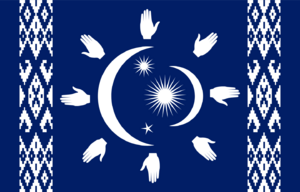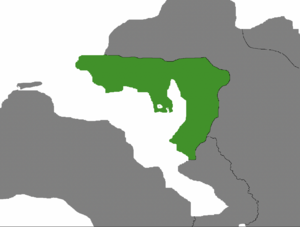Oklizuza Empire: Difference between revisions
No edit summary |
No edit summary |
||
| Line 53: | Line 53: | ||
|upper_house = <!--Name of governing body's upper house, if given (e.g. "Senate")--> | |upper_house = <!--Name of governing body's upper house, if given (e.g. "Senate")--> | ||
|lower_house = <!--Name of governing body's lower house, if given (e.g. "Chamber of Deputies")--> | |lower_house = <!--Name of governing body's lower house, if given (e.g. "Chamber of Deputies")--> | ||
|sovereignty_type = | |sovereignty_type = History <!--Brief description of country/territory's status ("Independence [from...]", "Autonomous province [of...]", etc)--> | ||
|sovereignty_note = | |sovereignty_note = | ||
|established_event1 = [[Great Exodus]]<!--First key event in history of country/territory's status or formation--> | |established_event1 = [[Great Exodus]]<!--First key event in history of country/territory's status or formation--> | ||
Revision as of 21:44, 4 September 2023
This article is incomplete because it is pending further input from participants, or it is a work-in-progress by one author. Please comment on this article's talk page to share your input, comments and questions. Note: To contribute to this article, you may need to seek help from the author(s) of this page. |
Ok'lizuza Empire Ilcuanatl | |
|---|---|
|
Flag | |
| Motto: Apate ihuacuan pazatlochlan May the spirits guide us | |
| Location | Northern Kalavik, north of Mychenar, east of The Lost Domain |
| Capital and largest city | Ixiqaimuztlan |
| Official languages | Uzati • Xocotec |
| Recognised regional languages | Uzati • Xocotec • Viuqumi • U'tzu • Qeyaqunaje • Tsaya Uyani • Other minority languages |
| Ethnic groups | 55.7% Uza 11.7% Others |
| Religion | Huacuan |
| Demonym(s) | Ok'lizuzati |
| Government | Theocratic Empire |
• Emperor | Xapatulec of Ixiqaimuztlan |
| Tlaclotan | |
| History | |
| 4000 AE - 1500 AE | |
| 1500 AE - 13 IE | |
| 13 IE - 481 IE | |
| 481 IE - 616 IE | |
| 616 IE - 830 IE | |
| 830 IE - 1160 IE | |
| 1160 IE - 1385 IE | |
| 1385 IE - | |
| Area | |
• | 548,688 km2 (211,850 sq mi) (14th) |
| Population | |
• 1384 estimate | 9,200,000 (8th) |
• 1380 census | 9,198,744 |
• Density | 16.77/km2 (43.4/sq mi) (21st) |
| Currency | Oachatl (Ø) |
The Ok'lizuza Empire (Uzati: Ilcuanatl; Xocotec: Elcunatec), also known as Ok'lizuza, is an empire in Northern Kalavik bordering Mykalimonia in the south and indirectly bordering Earlsdein in the north. The Ok'lizuza Empire is believed to be one of the oldest nations in Kalavik, having roots as far back as 4000 BC according to some scholars. Ok'lizuza is the 14th largest country in Thegye, and the 2nd largest in Kalavik with a land area of 548,688 square kilometers.
Ok'lizuza was started as a small Uzati kingdom; however, it expanded to become the regional power of Northern Kalavik over time through conquering its neighbors and assimilating them through the Ok'lizuzati religion, Huacuan, which translates to spirits in the Uzati language. Through the conquests of the Ok'lizuza Empire, Huacuan became the dominant religion in the empire, as well as a major religion in Northern Kalavik. 94.4% of all Ok'lizuzati are apart of the Huacuan religion. This, among other things, has made the Ok'lizuza Empire a prominent country in the region. The capital of Ok'lizuza is Ixiqaimuztlan, which is the largest city in Kalavik with 1.2 million inhabitants, it is also the most holy city in Huacuan, as it is believed that it is where life began.
The Ok'lizuza Empire is mostly isolationist, rarely ever starting conflict. Despite this, the Ok'lizuzati military is known among neighboring countries as being formidable and determined, as one of the core tenets of the military is to never surrender to the enemy. This has resulted in many instances where the Ok'lizuzati military has fought battles where every soldier died in combat. Ok'lizuza is also known for being one of the only countries in Thegye where cannibalism is accepted, as it is a sacrament in the Huacuan religion.
Etymology
Ok'lizuza means, "Land of (the) Uzati", in the Uzati language. Ok'liz is a contracted version of "Okatuaqaitli", which translates to "Land/property of (the)", and combined with Uza, creates the word Ok'lizuza. The native name of Ok'lizuza, "Ilcuanatl" translates as, "The Country/Kingdom.", it is a combination of il, which is the definite article, and cuanatl, which means country as in a politcal entity. A common mistranslation of Ilcuanatl is, "The Khanate"; however, in northern Kalavik, the Ok’lizuzati consider the term “Khanate” to be non-existent taking into account the geopolitical landscape in northern Kalavik.
The first recorded instance of "Ok'lizuza" being used is on the Obelisk of Tutomec in Xocotoma, where it is written,
"I, Tutomec, Emperor of the Xocota, stand proud next to my brethren.
As we fight against those who dare to challenge us,
Those from the mountains, who have not the capacity to read, or write,
And those who inhabit what they call, "Ok'lizuza". 1112" (1112 = 513 AE in this context)
The word "Ok'lizuza" is referred many more times across the years in Xocotec writings, alongside the native name of Ok'lizuza, "Ilcuanatl", which the Xocotec changed to "Elcunatec" in their language. It is unclear when the Uzati started using Ok'lizuza to the name of their country, however, though some scholars, like Tzoloxiqutan say that the name has always been used by the Uzati, even before the Great Exodus, while others claim that the Uzati started using "Ok'lizuza" a few hundred years after they settled into the area surrounding Ixiqaimuztlan, such as Uzoculpan, and Etomolco (Eitroikos) the Enlighted.

